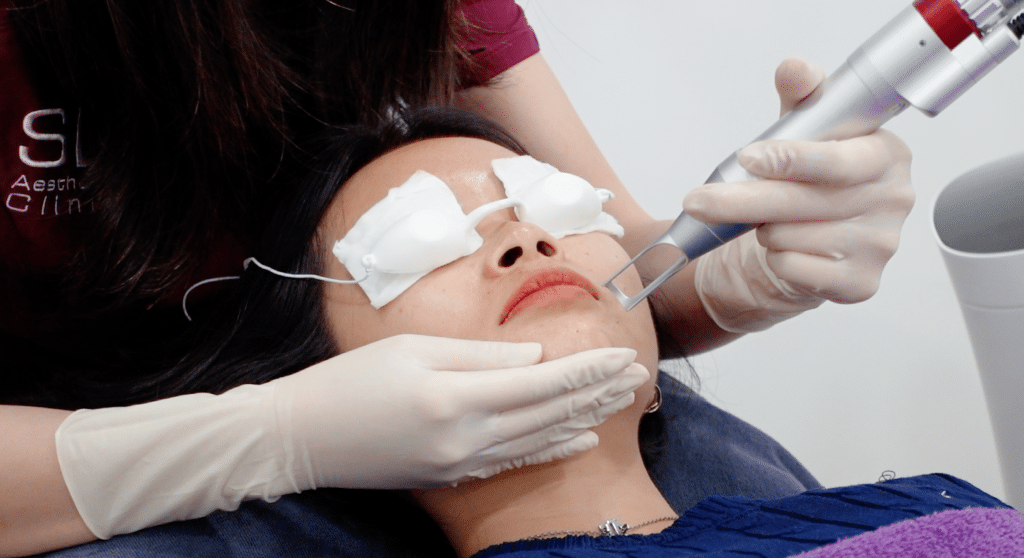
What Causes Cystic Acne And How To Treat It Effectively
- July 1, 2022
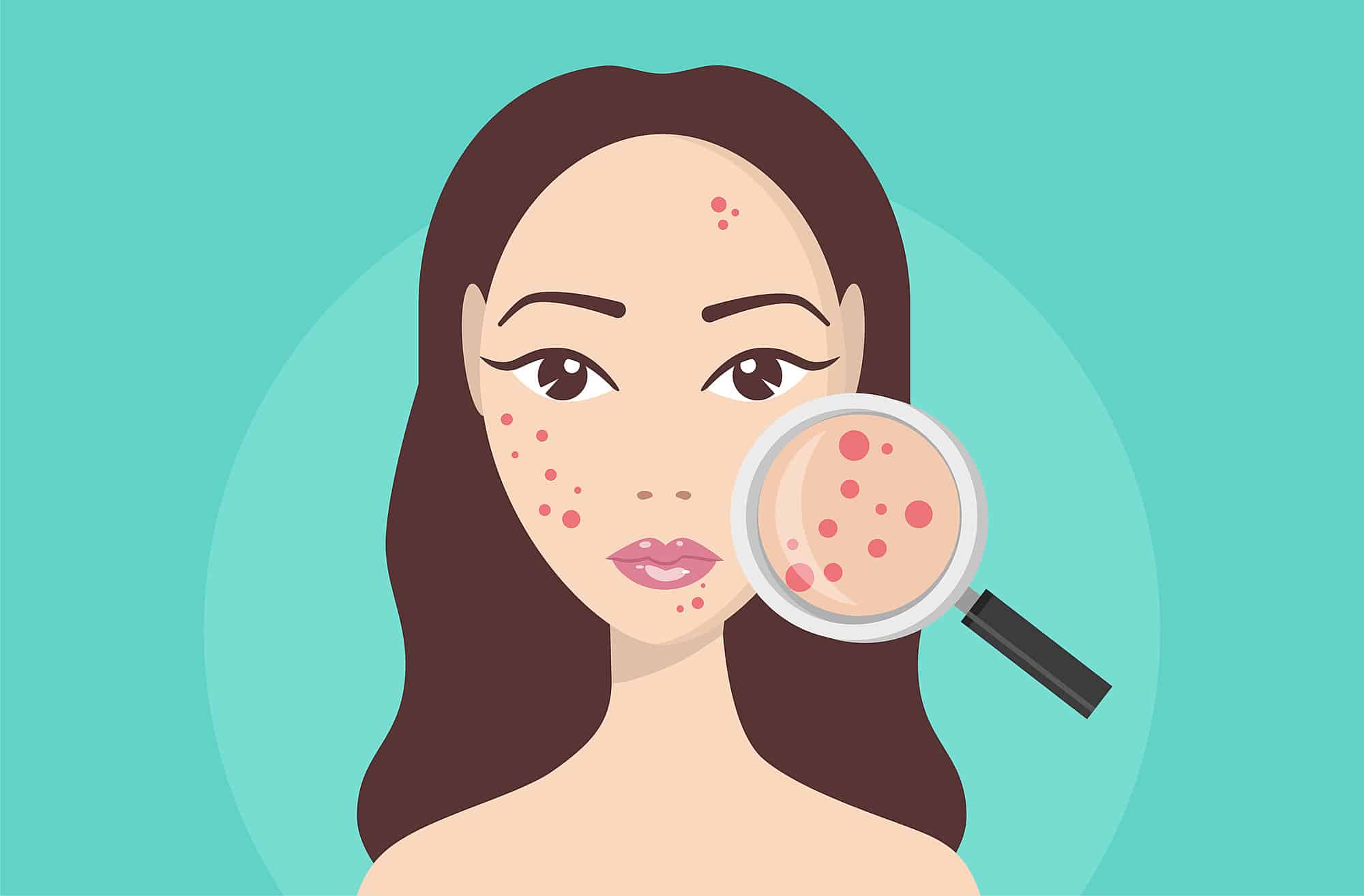

It’s hard to ignore cystic acne. Unlike whiteheads and blackheads, cystic acne develops deep beneath the skin, causing huge, painful pimples to form on your face, back, or chest. It takes more than just daily face washing to get rid of these persistent bumps, which can last for days or even weeks.
There are different trigger factors for cystic acne and it can sometimes be challenging to know where to begin in trying to root out these bumps. We’re here to help.
Keep reading to understand what cystic acne is, how it differs from typical acne, what causes it, and, most importantly, what cystic acne treatments in Singapore are available.
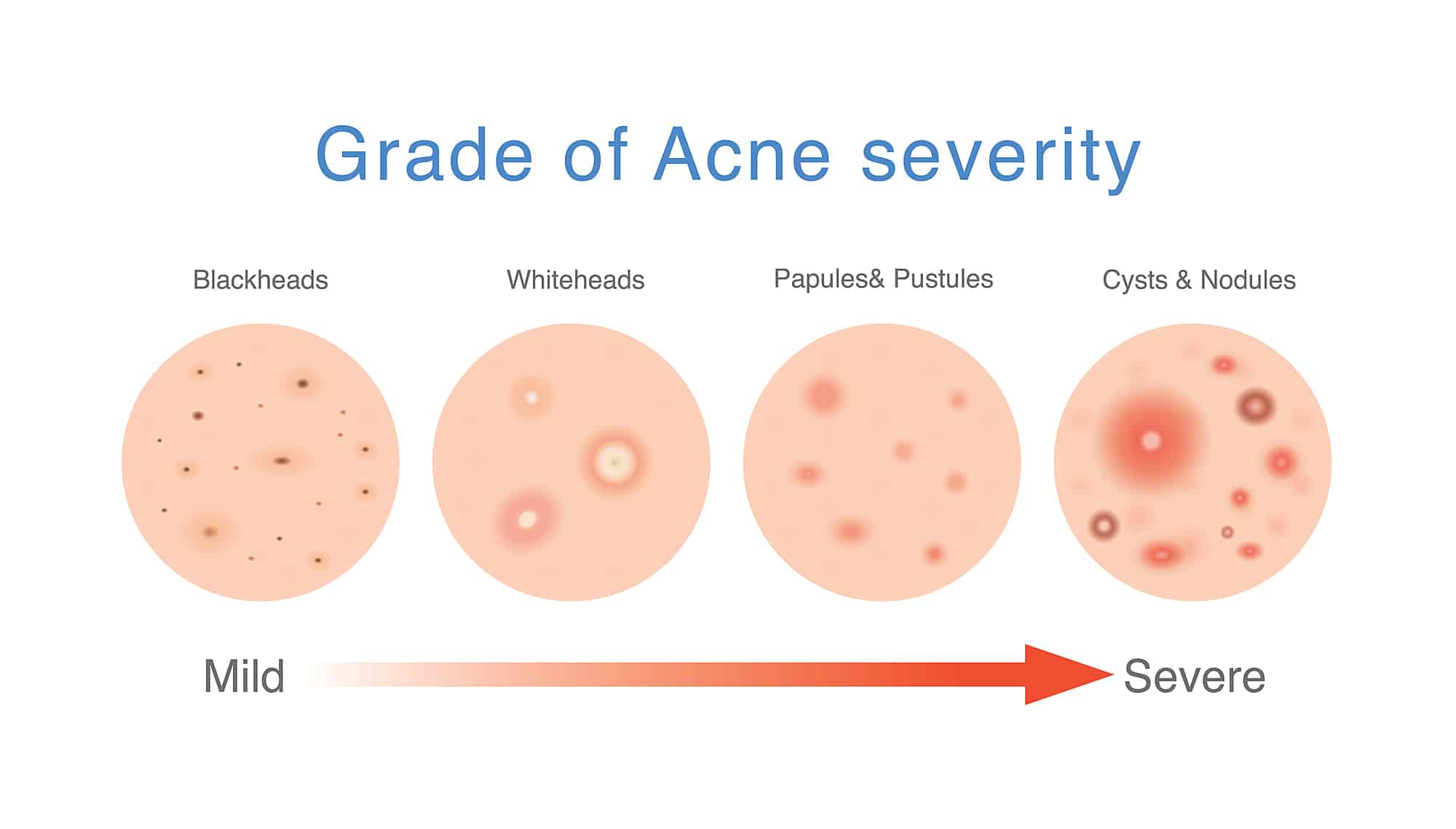
Cystic acne is a form of inflammatory acne that results in the formation of painful, pus-filled pimples deep beneath the skin. It is the most severe type of acne and appears when cysts form under the skin. This may happen as a result of bacteria, oil and dry skin cells being lodged in your pores. Acne cysts are more likely to lead to scarring compared to blackheads and whiteheads.
While acne can affect everyone, individuals with oily skin are more likely to experience cystic acne. People undergoing hormonal imbalances, like older adults, women and teenagers, are also more likely to develop cystic acne.
The bumps that develop during cystic acne are not only painful but persistent. To avoid discomfort, the best course of action is to consult a doctor, who can provide you with medication.
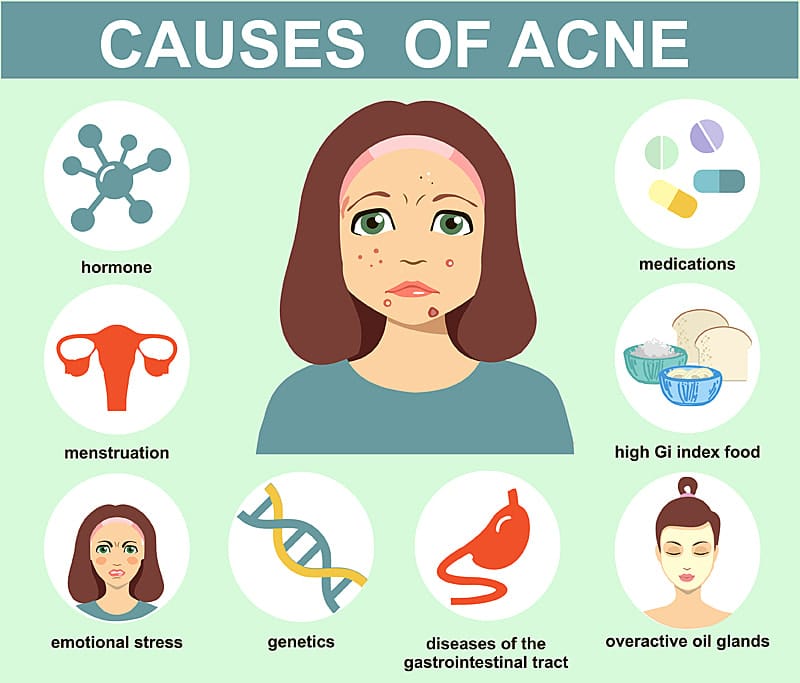
When bacteria, dead skin cells and sebum are trapped deep beneath the skin’s surface and become infected, cystic acne develops. This leads to a large and swollen cyst (lump) which can be uncomfortable to the touch.
There are numerous reasons why some people may experience cystic acne more frequently or intensely than others. Understanding the various factors that lead to cystic acne flare-ups will assist you and your doctor in developing a personalised acne removal treatment plan for you.
A buildup of bacteria and sebum causes cystic acne. This might not have to do with how frequently you wash your face. It could be because of the skincare products you use.
Long periods of wearing makeup or tight clothing can aggravate cystic acne by trapping moisture, sweat, and oil.
Cystic acne may be triggered by hormonal changes, such as those brought on by menopause, menstruation, pregnancy and medical diseases like polycystic ovarian syndrome (PCOS). You can also develop cystic acne when you are undergoing androgen replacement therapy (ART) and other types of hormone therapy.
Teenagers are also more susceptible due to a surge in hormones. For example, male teens experience a 30 fold increase in testosterones, which lead to increased sebum production. This in turn increases the likelihood of cystic acne formation.
Contrary to popular belief, there is no conclusive evidence that consuming oily meals like potato chips, french fries or chocolate will result in acne. Having said that, it’s important to consider your food choices and their impact on your skin.
You may discover that specific meals cause your cystic acne to break out more frequently. If you talk to a specialist, they may come up with a diet plan for you. They may also suggest that you keep a food journal to track how your skin reacts to different meals.
Scientists have found that if one or both of your parents had cystic acne, you have a higher chance of developing the condition. Genetic factors are much more prominent in the case of adult acne, which is defined as acne that appears after age 25.
Cystic acne is similar to another form of severe acne called nodular acne. Both result in deep, uncomfortable lumps under the skin. Both also have the potential to leave scars. However, acne cysts, unlike acne nodules, contain pus. Because of this, acne nodules are more solid and tougher than acne cysts.
Also unlike acne nodules, acne cysts tend to have a whitehead or blackhead in the centre of their formation. Both conditions can also affect anyone, across ages and genders.
As with nodular acne, the best way to treat cystic acne is to consult a specialist. Never squeeze the bumps on your face as this may exacerbate the acne and result in scarring.
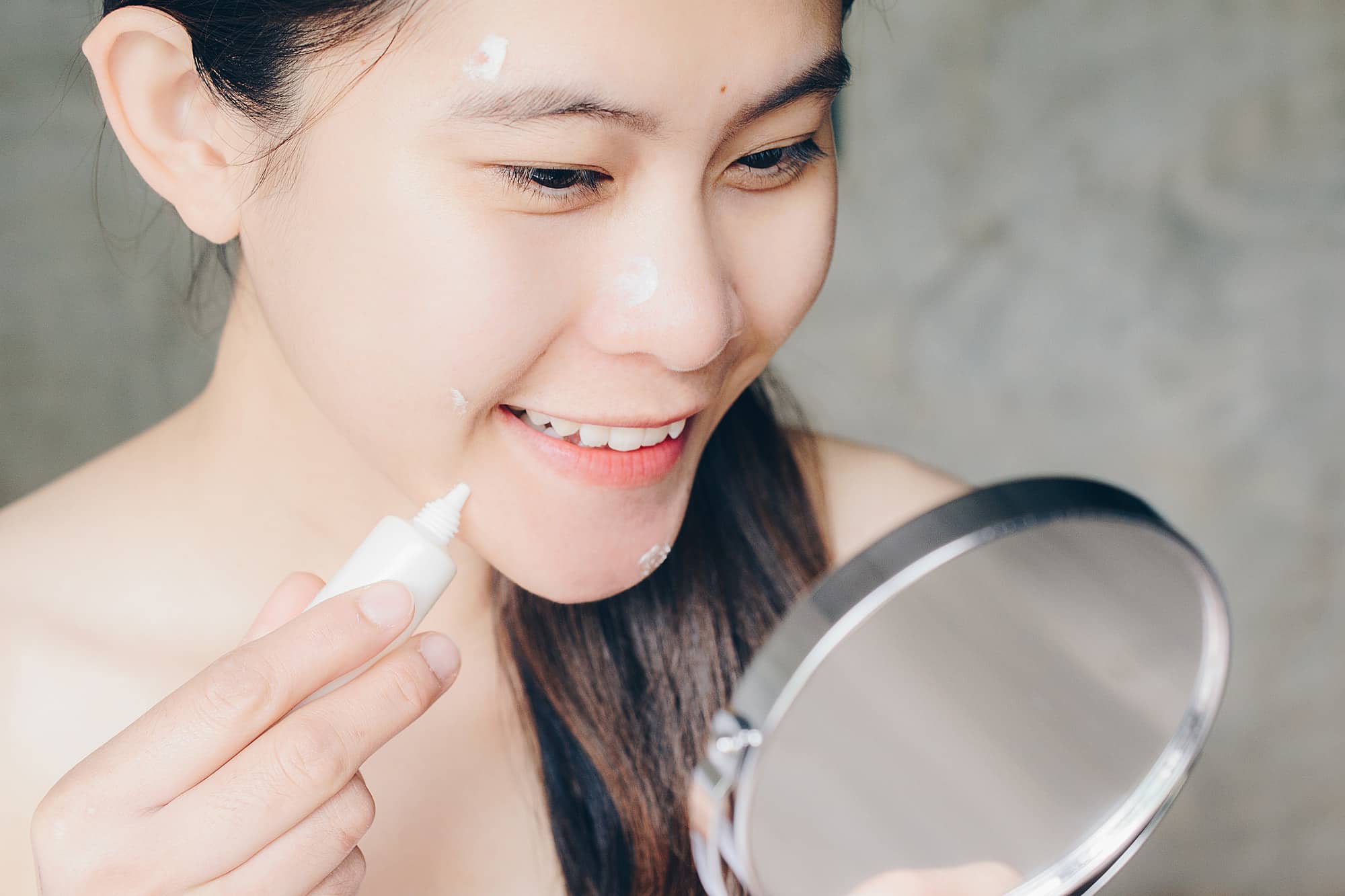
Over-the-counter (OTC) medications might not be effective for treating cystic acne because of how severe the condition is. A specialist can prescribe you medication based on your symptoms and health profile. It might take several weeks or months before visible results can be seen.
Here are some treatments your doctor might recommend:
If cystic acne affects a significant portion of your skin, oral antibiotics may be used to treat it. These have an antibacterial and anti-inflammatory effect that helps to prevent the development of cystic acne. Antibiotics, however, do not help with excess oil or dead skin cells.
Due to concerns about bacteria developing resistance to the antibiotics that are meant to kill it, antibiotics should only be used for a short term. If antibiotics are ineffective, your doctor will probably advise you to begin taking isotretinoin.
The most effective treatment for cystic acne is isotretinoin (Accutane), a strong prescription medicine. It is made from a potent form of vitamin A and should be taken daily as tablets.
Isotretinoin has some common but mild side effects, such as:
Serious side effects are rare and may include mood disorders, severe digestive issues and intense body pain.
Topical retinoids are also generated from vitamin A, though they’re less potent than isotretinoin. They combat cystic acne by unclogging hair follicles. Retinoids are occasionally used in combination with antibiotics.
Topical retinoids are available as creams, gels and lotions and can be applied every day. You may find some retinoids, like Adapalene, over the counter, but the presciption ones tend to be be more effective due to higher concentration.
This is ideal for quick resolution but doesn’t prevent future occurence. An important active component found in cortisone acne injections is cortisone. It is a type of steroid hormone that the body’s adrenal gland also produces in response to stress.
The name of the procedure is an intralesional corticosteroid injection in medical terminology. In Singapore, it is also frequently referred to as cortisone acne injections, acne steroid shots, and cystic acne injections.
With the use of several acidic solutions, the skin is exfoliated and regenerated during a chemical peel. Chemical peel solutions can be produced naturally or synthesised in a laboratory.
Dead skin cells are removed by the chemical solutions, which disintegrate them, allowing new skin to develop in their place. The new layer of skin has a radiant glow and feels softer to the touch.
Spironolactone is typically used as a diuretic (pills for clearing excess water) to assist in the treatment of edema (swelling) and high blood pressure. However, it can also treat cystic acne by controlling excess androgen that can cause inflammatory acne.
It is usually prescribed only for women because a reduction in androgen could lead to a lowering of testosterone in men. Spironolactone might not be prescribed for pregnant women because of its hormonal effects.
Oral contraceptives may be a good option for women whose hormone levels fluctuate during their monthly cycle.
Estrogen, which is found in birth control pills, could help balance hormone levels and lessen acne. However, if you smoke, have blood clots, or are attempting to conceive, oral contraceptives might not be suitable for you.
In most circumstances, you’ll need to consult a specialist to get rid of cystic acne. They are your best resource for treatment options, including prescription medication and surgical removal.
Besides providing medical treatment, a specialist can advise you on how to avoid future acne outbreaks. Do note that any new skincare routine may take a while to produce noticeable benefits and a specialist can guide you through this period.
If you are looking to get cystic acne treatment in Singapore, book an appointment with us. The doctors in SL Aesthetic Clinic have many years of experience in treating cystic acne and other skin conditions.
If you are interested in learning more about cystic acne treatment or would like to schedule a consultation with our team, contact us today.
Like what you read? Share them!